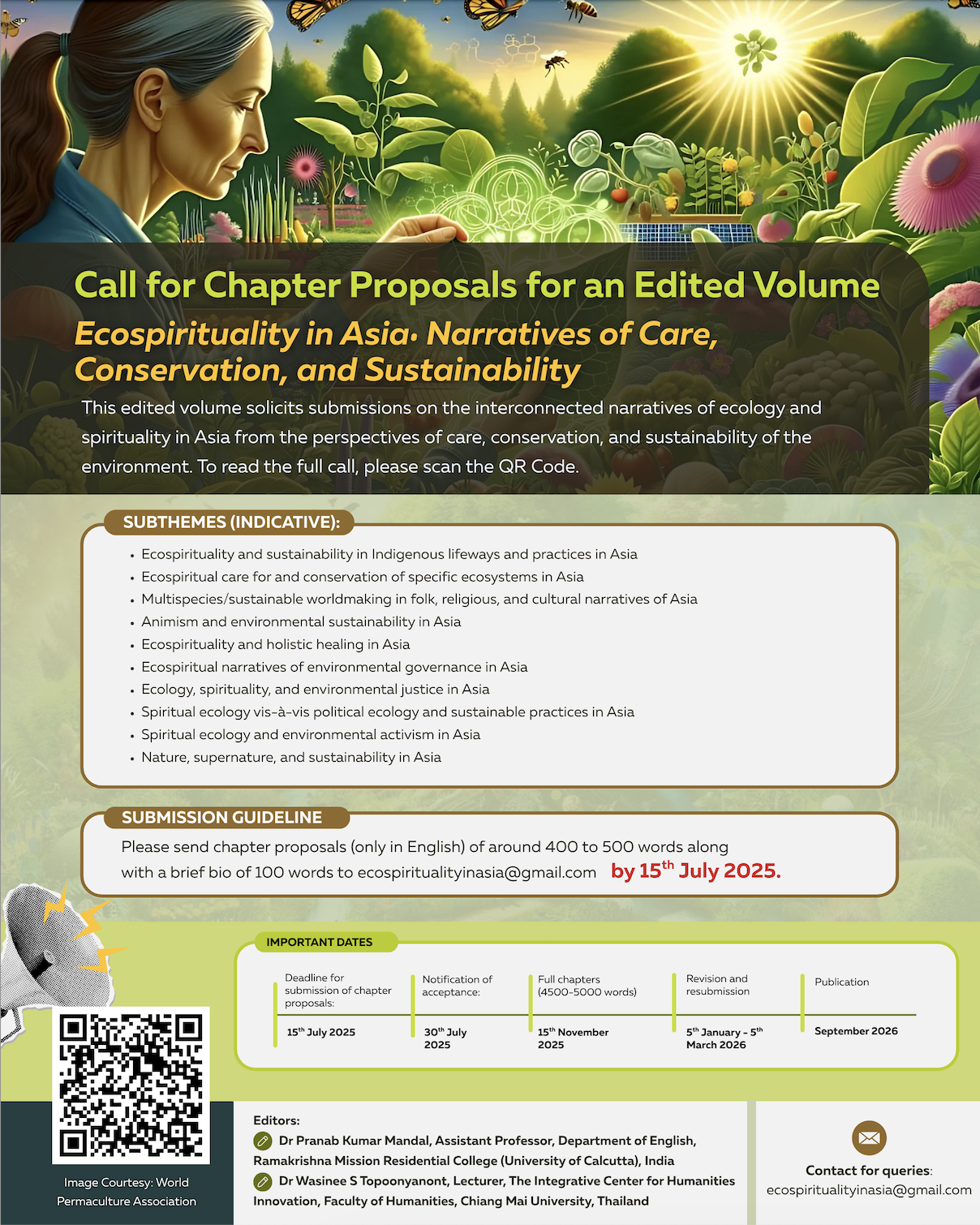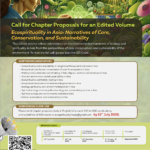
02 Aug Call for chapter proposals for an edited volume titled Ecospirituality in Asia: Narratives of Care, Conservation, and Sustainability
Call for chapter proposals for an edited volume
titled
Ecospirituality in Asia:
Narratives of Care, Conservation, and Sustainability
This edited volume draws upon the interconnected narratives of ecology and spirituality in Asia from the perspectives of care, conservation, and sustainability of the environment. The intersection between ecology and spirituality, which is exemplified through terms such as ecospirituality, ecological spirituality, and spiritual ecology—broadly conveys that ecology and spirituality are deeply connected and spiritual reverence to ecology or spiritualisation of ecology is a potential approach to environmental sustainability. By combining a non-extractive, reverential, and conservational attitude to ecology, ecospiritual approach is sharply different from the Anthropocentric one which looks down upon ecology from a hierarchical and consumerist-capitalist worldview. Ecospirituality identifies nature as a divine source of life, an idea that is broadly prevalent in the traditional lifeways across Asia, which not only depend on nature ontologically but also function integrally by keeping nature as a pivot to the community’s mundane existence, cultural practices, spiritual security, and material prosperity. Ecospirituality as an approach to environmental sustainability by drawing connections between religious beliefs, animism, spiritual practices, and multispecies ecologies is often opposed to the scientific advocacies for sustainability practices.
Ecospirituality is the “manifestation of the spiritual connection between human beings and the environment,” which fosters “a relational view of person to planet, inner to outer landscape, and soul to soil” (Lincoln 2000, 227)[1]. As an approach to environmental sustainability, it integrates natural energy, multispecies cohabitation, and spiritual wellbeing towards sustainable worldmaking and represents “a synergy between science and spirituality, intellect and intuition, objectivity and subjectivity, and human and planet” (2000, 230). The premise of ecospirituality also includes beliefs and practices such as facilitating ecological reciprocity between humans and more-than-humans, worshipping nature as a sacred power, and recognising nature as a dwelling place of gods and spirits (Carroll 2004[2], Nath 2010[3], Lester and Böhm 2020[4]), which we find deeply ingrained in various community lifeways in Asia.
Although this book is not in favour of romanticising traditional ecologies in Asia as always already ecospiritual and therefore sustainable, it would like to highlight the ecospiritual practices in Asia that care for, conserve, and protect the environment. This book builds on the proposition that having a sacred feeling for the earth elements can essentially lessen, if not solve the problems of environmental precarities. Although we are looking for specific case studies of community practices that integrate ecospirituality and sustainability in Asia, we would also like to encourage submissions on the following subthemes. The list is only indicative and not restrictive in nature.
Ecospirituality and sustainability in Indigenous lifeways and practices in Asia
Ecospiritual care for and conservation of specific ecosystems in Asia
Multispecies/sustainable worldmaking in folk, religious, and cultural narratives of Asia
Animism and environmental sustainability in Asia
Ecospirituality and holistic healing in Asia
Ecospiritual narratives of environmental governance in Asia
Ecology, spirituality, and environmental justice in Asia
Spiritual ecology vis-à-vis political ecology and sustainable practices in Asia
Spiritual ecology and environmental activism in Asia
Nature, supernature, and sustainability in Asia
Please send chapter proposals (only in English) of around 400 to 500 words along with a brief bio of 100 words to ecospiritualityinasia@gmail.com by 15th July 2025.
Important Dates:
Last Date of submission of chapter proposals: 15th July 2025
Notification of acceptance: 30th July 2025
Full chapters (4500-5000 words) due: 15th November 2025
Revision and resubmission: 5th January to 5th March 2026
Publication: September 2026
Editors:
Dr Pranab Kumar Mandal, Assistant Professor, Department of English, Ramakrishna Mission Residential College (University of Calcutta), India
Dr Wasinee S Topoonyanont, Lecturer, The Integrative Center for Humanities Innovation, Faculty of Humanities, Chiang Mai University, Thailand
Proposed publishing house:
We are in talk with a UK-based University Press for publishing this edited book. However, we might also consider Bloomsbury, Palgrave Macmillan/Springer Nature, and Routledge as potential publishing houses.
Contact for queries: ecospiritualityinasia@gmail.com
[1] Lincoln, Valerie. 2000. “Ecospirituality: A Pattern That Connects.” Journal of Holistic Nursing 18.3: 227-244. [2] Carroll, John E. 2004. Sustainability and Spirituality. Albany: SUNY Press. [3] Nath, Jemál. 2010. “‘God is a vegetarian’: The food, health and bio-spirituality of Hare Krishna, Buddhist and Seventh-Day Adventist devotees.” Health Sociology Review 19.3: 356–368. [4] Lester, Tamas, and Steffen Böhm. 2020. “Ecospirituality and Sustainability Transitions: Agency Towards Degrowth.” Religion, State and Society 48.1: 56-73.



Sorry, the comment form is closed at this time.